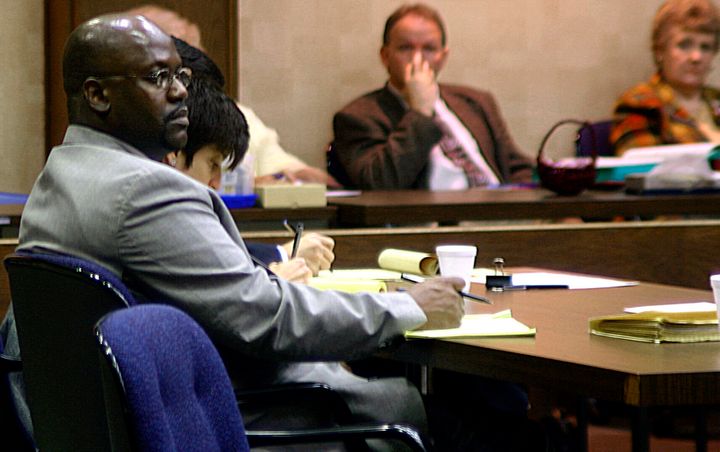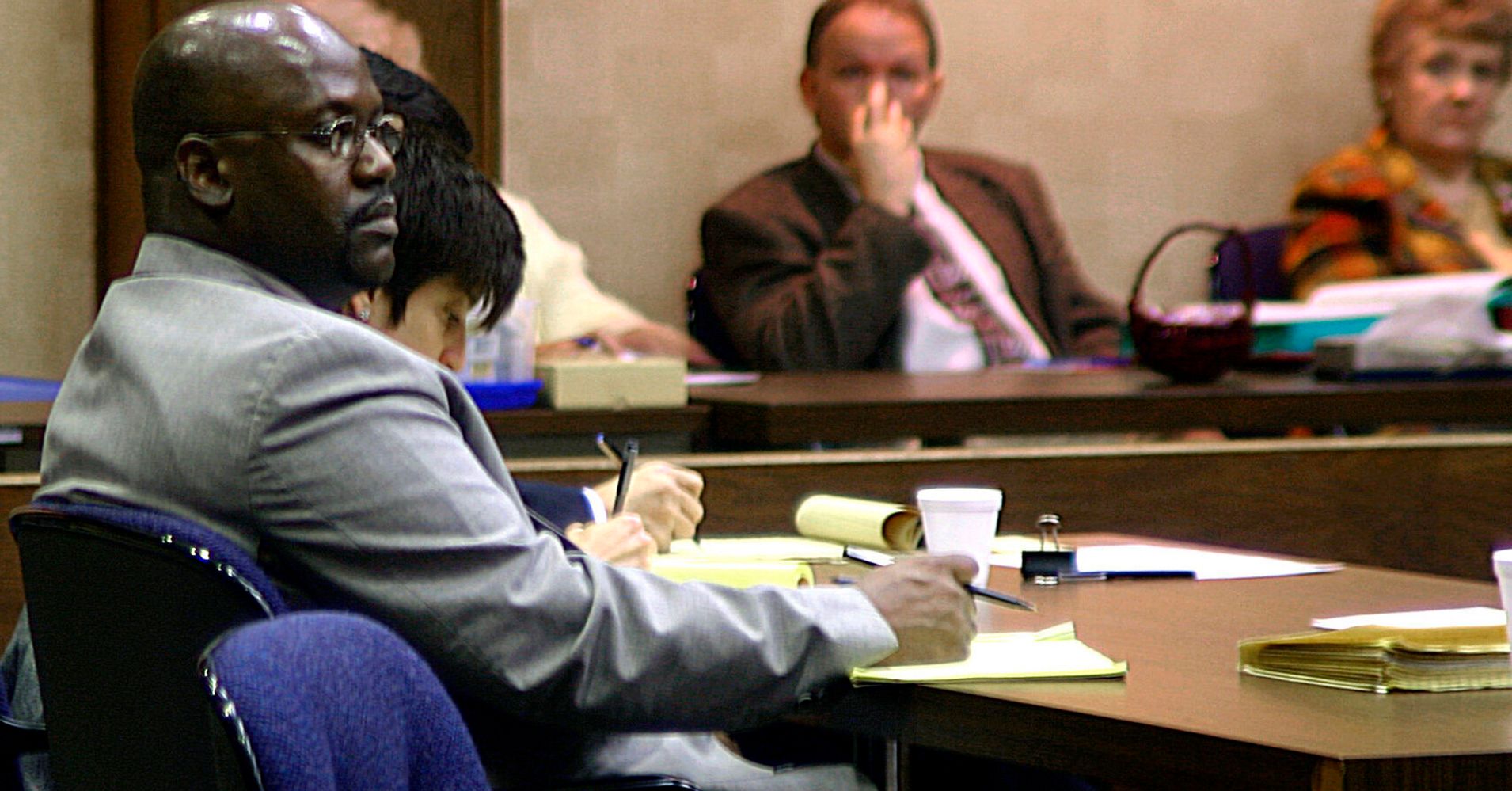[ad_1]
The U.S. Supreme Court on Friday overturned a 2010 conviction in the case of Curtis Flowers, a black man on death row in Mississippi for the 1996 murder of four people in a furniture store.
In a 7-2 decision authored by Justice Brett Kavanaugh, the high court sided with Curtis’ lawyers, who argued that District Attorney Doug Evans, who is white, excluded potential black jurors on the basis of race in the 2010 trial. The defense attorneys said the Mississippi Supreme Court failed to properly apply U.S. Supreme Court precedent in determining whether people were unconstitutionally kept off a jury on the basis of race.
Evans has attempted to convict Flowers six times over the years: in 1997, 1999, 2004, 2007, 2008 and 2010. Two trials — the only ones with more than one black juror — resulted in hung juries. The Mississippi Supreme Court overturned the three earlier convictions on the basis of prosecutorial misconduct, including that Evans improperly excluded potential black jurors.
But the Mississippi Supreme Court upheld the 2010 conviction, and Flowers was sentenced to death. In March, the U.S. Supreme Court heard oral argument in Flowers v. Mississippi, with both conservative and liberal justices pointing to the “troubling” nature of the case.
In Friday’s opinion, Kavanaugh cited “the extraordinary facts of this case” as the justices’ primary consideration in their ruling.

In determining that the state of Mississippi “engaged in disparate treatment of black and white prospective jurors,” Kavanaugh noted the abundance of incidents of racial discrimination.
“In sum, the State’s pattern of striking black prospective jurors persisted from Flowers’ first trial through Flowers’ sixth trial,” he wrote. “In the six trials combined, the State struck 41 of the 42 black prospective jurors it could have struck. At the sixth trial, the State struck five of six. At the sixth trial, moreover, the State engaged in dramatically disparate questioning of black and white prospective jurors. And it engaged in disparate treatment of black and white prospective jurors, in particular by striking black prospective juror Carolyn Wright.”
Justices Clarence Thomas and Neil Gorsuch dissented. Thomas wrote the dissenting opinion, arguing that the proceedings in Flowers’ case “presented no evidence whatsoever of purposeful race discrimination,” and that Wright “would have been stricken by any competent attorney.”
Thomas spent much of the first part of his opinion questioning why his colleagues took the case in the first place — for example, citing the “fair amount of media attention” surrounding the case.
He went on to claim that “the Court wasted the State’s, defendant’s, and lower court’s time and resources.”
“Although the Court’s opinion might boost its self-esteem, it also needlessly prolongs the suffering of four victims’ families,” Thomas wrote.
Flowers’ case and the clear racial bias that threads through it were detailed in an award-winning podcast by American Public Media called “In the Dark.”
In the course of reporting the podcast, APM journalists compiled a database of trials conducted by Evans and his team to see if the district attorney had a history of racial bias in jury selection. Evans was first elected chief prosecutor for the state’s Fifth Circuit Court District in 1992. The reporters found that in 225 trials between 1992 and 2017, his office excluded 50% of eligible black jurors and just 11% of eligible white jurors. Evans’ prosecutors were over four times more likely to strike black jurors than to strike white jurors.
Flowers’ attorneys argued before the U.S. Supreme Court that the district attorney’s pattern of excluding black people from juries constituted a violation of a key 1986 Supreme Court decision, Batson v. Kentucky. That ruling prohibits prosecutors and defense attorneys from using their peremptory challenges to strike potential jurors on the basis of race.
“Part of Batson was about confidence of the community and the fairness of the criminal justice system,” Kavanaugh said during oral argument in March. “That was against a backdrop of a lot of decades of all-white juries convicting black defendants.”
Flowers’ case goes back to the July 1996 murder of four people at Tardy Furniture in Winona, Mississippi. The victims ― store owner Bertha Tardy, 59, and employees Carmen Rigby, 45, Robert Golden, 42, and Derrick “Bo Bo” Stewart, 16 ― were all found shot in the head. Three of the victims were dead when police arrived. Stewart was taken to a hospital, where he later died.
Flowers, who had no criminal record, was charged with the killings in part because he had briefly worked at the store and was fired several days before. He has been behind bars for more than 20 years now.
With his latest conviction overturned by the U.S. Supreme Court, Flowers could face a seventh trial depending on how Evans chooses to proceed. The district attorney is running unopposed for reelection in November of this year.
A representative who answered the phone at Evans’ office Friday morning said that he was in court and not immediately available for comment.
Reporters from “In the Dark” approached Evans at a restaurant on Friday to get his thoughts on the court’s ruling. The district attorney said there was “no doubt” in his mind about Flowers’ guilt.
“Courts are just like me and you,” Evans said. “Everybody’s got opinions.”
The district attorney added that he has not yet decided whether he will pursue a seventh trial against Flowers. He also denied the court’s determination that he excluded black people from the jury.
“If they said that, that is not true,” Evans said.
American Public Media said Friday that the podcast will continue to follow Flowers’ case in two additional episodes, and if a seventh trial moves forward, Flowers’ lawyers will be able to use the new evidence detailed in the podcast.
See the Supreme Court’s ruling below:
This story has been updated with more details from Friday’s ruling, a statement from American Public Media and a comment from Evans.
Sam Levine contributed reporting.
REAL LIFE. REAL NEWS. REAL VOICES.
Help us tell more of the stories that matter from voices that too often remain unheard.
[ad_2]
Source link

